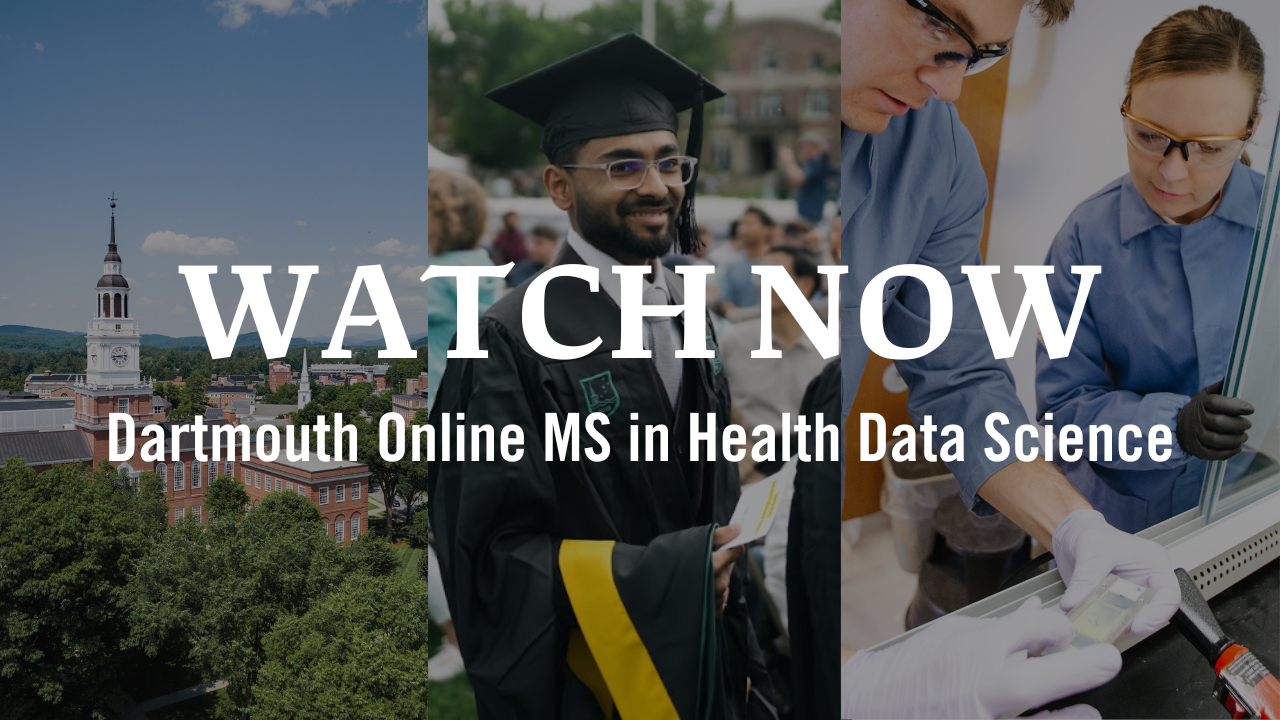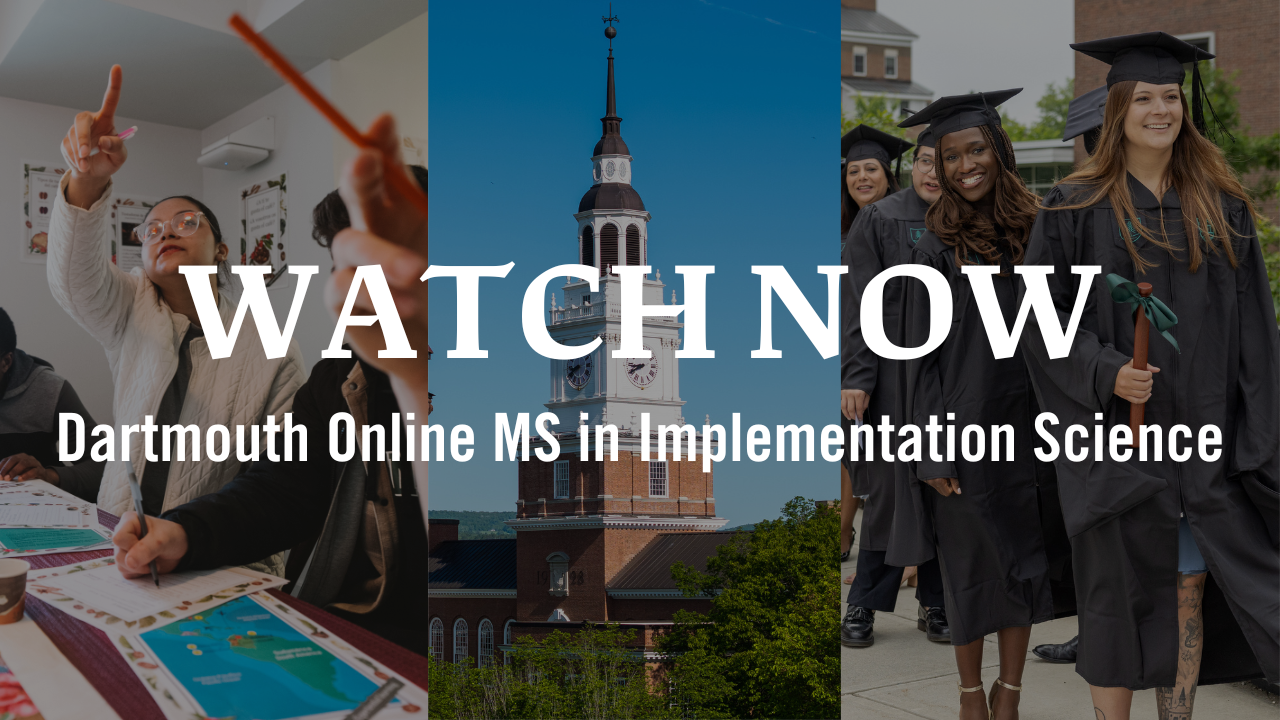Frequently Asked Questions
Choosing the right graduate program is an important decision, and we know it comes with many questions. We're here to help by providing clear, straightforward answers about admissions, tuition, scholarships, and financial aid. Below, you'll find responses to some of the most commonly asked questions to guide you through the process and help you plan for your education with confidence.
All applications are submitted to Dartmouth through SOPHAS, the centralized application service for public health offered through ASPPH (the Association of Schools and Programs of Public Health).
We look forward to reviewing your application!
SOPHAS (the centralized application service for public health) does offer application fee waivers, but applicants must request a waiver with them, not Dartmouth. More information can be found here or by reaching out to SOPHAS directly.
All application materials are important. We believe the personal statement is what differentiates each applicant.
Dartmouth’s Health Sciences programs use SOPHAS (Schools of Public Health Application Service) for applications. SOPHAS is a centralized application service that allows applicants to apply to multiple public health programs with a single application.
Dartmouth offers multiple application deadlines through SOPHAS, each with different implications:
Priority Deadline (December 1): Ensures full consideration for merit-based scholarships and provides early access to advising and networking opportunities with current students, alumni, and fellow matriculants.
Final Guaranteed Scholarship Deadline (February 1): Last deadline for guaranteed merit-based scholarship review. Applicants who apply by this date are still eligible for admission and funding, though scholarship availability may be more limited.
Final Admissions Deadline (April 15): Applications submitted by this date are still reviewed on a rolling basis, and applicants remain eligible for scholarships. However, early submission is strongly encouraged to maximize funding opportunities.
After submitting, SOPHAS requires 2-4 weeks to verify transcripts and recommendations before sending your application to Dartmouth. To avoid delays, applicants should submit all materials well before the deadline. Please note that Dartmouth does not receive any of your application materials from SOPHAS until the verification process is complete.
Application decisions for Dartmouth's degree programs, including the MPH and MS degrees, are typically released within 4-6 weeks of receiving a completed application after the first application deadline.
Submission of GRE scores is not required and is not reviewed for those applying to our Master of Public Health (MPH), Master of Science (MS) in Healthcare Research, and MS in Implementation Science programs. The GRE is optional for those interested in our MS in Epidemiology, Medical Informatics, or Health Data Science.
In lieu of a minimum GPA requirement we take a holistic approach to review each application. Of the most recent matriculated cohort, the average GPA range was 3.4 - 3.7.
We offer scholarships to U.S. permanent residents and international students based on merit. Scholarships offered by the Geisel School of Medicine Master's Programs range anywhere from $10,000 to up to half of tuition. Scholarship funds are equally dispersed across each term you are enrolled as a student.
Priority consideration is given to candidates who submit their application by the December 1 priority deadline. All candidates whose application is submitted by February 1 will be reviewed for a scholarship.
An additional scholarship application is not required.
More information about scholarships, grants, and loans is available here.
Dartmouth is committed to making graduate education accessible. We offer merit-based scholarships to all applicants, regardless of citizenship status. Scholarships are distributed equally across terms, and recipients are typically notified upon admission. Additional funding opportunities may be available through external organizations, and students are encouraged to explore loan and grant options as well.
Our admissions office will review the application materials submitted by candidates for admission. In assessing merit, we consider a variety of factors, including: exceptional academic performance, leadership experience, professional accomplishments, service, and the ability to contribute meaningfully to the Dartmouth community.
Students in our full-time, accelerated programs often find the coursework demanding and typically do not take on full-time work. However, some part-time research assistantships or other academic opportunities may be available. Online/hybrid students often continue working while completing their degree, as the flexible format allows for professional and academic balance.
Summer Term Start: MPH Accelerated On-Campus, MPH Online or Hybrid, and On-Campus MS programs in Epidemiology, Healthcare Research, Health Data Science, and Medical Informatics.
Fall Term Start: Online MS programs in Health Data Science and Implementation Science.
Yes! Dartmouth encourages students to engage beyond the classroom by joining student organizations at Geisel and across campus. These groups offer opportunities to connect with peers, develop leadership skills, and explore professional interests. Popular among MPH students are:
- Global Health Fellows
- Indian Health Services Trip
- UNICEF Club
- Dartmouth Healthcare Foundations
- Medical Ethics Interest Group
- Dartmouth’s Center for Health Equity
These organizations provide valuable experiences and connections that enrich both academic and professional growth.
Accelerated On-Campus Programs: The average age of these students is 24.
Online/Hybrid Programs: The majority of the online program students are mid-career professionals with 2+ years of work experience. The average age of these students is 30.
For the MPH and MS in Healthcare Research programs, we offer a generalist curriculum that emphasizes the core tenets of public health, giving our students a well-rounded view of the field. While we do not have specific concentrations or areas of study, students have ample opportunities to pursue individual interests through class assignments, internships, research, and myriad electives. Through case studies, problem sets, and video lectures, students take a deep dive into content such as epidemiology, biostatistics, and healthcare ethics. Mentored by a Dartmouth faculty member, students also design and complete a practicum project. These projects can range in size and scope from quality improvement in a medical setting to a project centered around policy analysis or development.
The MS in Epidemiology, Health Data Science, and Medical Informatics are quantitative-focused programs that train highly qualified students to identify and solve healthcare system challenges with ingenuity and effectiveness. These degrees provide an unmatched interdisciplinary education in the areas of data analysis, health systems pipelines, computer science, statistical analysis, bioinformatics, epidemiology, and healthcare for careers in government, health care, health system management, and medical research. Each degree offers space for electives to delve more deeply into your particular interests, and students pursue a capstone project where they can engage in research or an internship to further advance their knowledge and real-world experience.
The MS in Implementation Science As one of the first implementation science master’s programs in the United States, MSIS addresses an essential and growing need for robust implementation science training for the academic and professional workforce. The program provides rigorous training in dissemination and implementation science including theory, methods, and practical applications, as well as essential project management, collaboration, and leadership skills. Graduates will be equipped to apply these skills in a broad range of disciplines and communities throughout the country and the world.
Coursework varies by program and format. Full-time, accelerated programs require a significant time commitment, similar to a full-time job. Online and hybrid programs offer more flexibility but still require rigorous engagement in coursework, discussions, and projects. Students should plan their schedules accordingly to meet academic expectations.
MPH: Students take one course at a time online (about 12-15 hours of work per week) and the hybrid students have the opportunity to spend up to three times per year on the Dartmouth campus, interacting face-to-face with each other and faculty.
Health Data Science: Students take one course at a time online, which is about 15-20 hours of work per week.
Implementation Science: Accelerated, full-time students take two concurrent courses at a time and spend approximately 30-40 hours per week on coursework and class time.
Traditional, part-time students take one course at a time and spend approximately 16-20 hours per week on coursework and class time.
From day one, Dartmouth provides comprehensive career and professional development support, both during your program and beyond. We work with you to create a personalized career plan, connect you with faculty and peer networks, and offer one-on-one coaching with our career development manager. You’ll receive guidance on resume building, networking, job searches, and interview preparation.
For those pursuing further education, we provide support in applying to PhD, MD, DO, and other professional programs. Additionally, you’ll gain access to a network of over 2,000 alumni and participate in professional development workshops, clinician panels, and networking events.
Students interested in a dual-degree program must apply separately to each collaborating school and meet both programs' admissions requirements. Once accepted, students can pursue an integrated curriculum designed to align with their academic and professional goals.
Each dual-degree program has specific structures and timelines. Some programs allow students to complete one year in one program before transitioning to the other, while others integrate coursework from both throughout the program. Applicants may have the option to apply simultaneously to both programs or apply to the second program after starting their first. Be sure to review the specific admissions timelines and requirements for your chosen dual-degree path.
PRIORITY SCHOLARSHIP DEADLINE: DECEMBER 1
REGISTER FOR AN UPCOMING VIRTUAL INFORMATION SESSION:
DISCOVER DARTMOUTH ALUMNI
Receive the latest updates on applying to Dartmouth
TALK TO OUR ADMISSIONS TEAM
Courtney Theroux
DIRECTOR, ENROLLMENT MANAGEMENT
Amanda Williams
ASSOCIATE DIRECTOR, ADMISSIONS AND RECRUITMENT
Hannah Kassel
ASSISTANT DIRECTOR, ADMISSIONS AND RECRUITMENT
Mia Soucy
ADMISSIONS MANAGER
ALUMNI CAREER STORY
Dominique Lee, MPH’20
CEO, Planned Parenthood New England,




